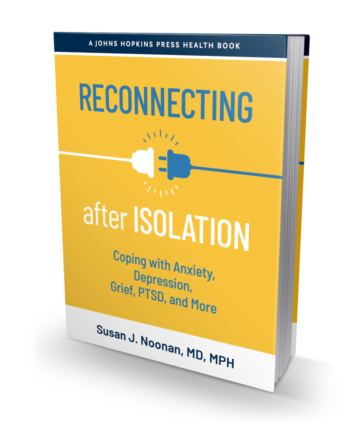September is Suicide Prevention Awareness Month, recognizing one of the greatest tragedies in the world. Suicide is usually considered an impulsive act in a troubled person who sees no way to change his or her painful circumstances and happens when one’s deep emotional pain or stressor exceeds his ability to cope with that pain. In 2017 it was reported that 47,173 persons committed suicide in the United States, with 1.4 million suicide attempts. Overall, suicide rates have been rising in the Unites States, increasing by approximately 25 to 30 percent from 1999 to 2016 in all states but one.
Current literature reports mental illness and burnout in physicians, medical trainees and other healthcare staff. You may be surprised to learn that even before the COVID-19 pandemic, burnout and depression was found to be more common in physicians than in the general population, affecting 28.8% of resident physicians in training, 13% of male physicians, 20% of female physicians, and approximately 15% to 30% of medical students. Suicide rates are also higher in these groups.
And medical professionals are prone to burnout as well, a state of emotional, physical, and mental exhaustion caused by prolonged stress and fatigue; the sense of having reached the limits of your endurance and ability to cope. It’s the result of too many demands on your strength, resources, time, and energy.
All of this strikes a familiar chord with me as a physician and long-term patient who has personal experience living with depression. It highlights a pervasive problem in the house of medicine: far too many health care professionals fear receiving mental health services. In fact, nearly 40% of physicians report reluctance to seek mental health care due to fear of repercussions to their medical licensure.
Working in the healthcare profession is a privilege, but it also carries some personal risks that are often ignored. So it’s helpful to understand what contributes to provider burnout and depression. In part it’s the nature of the profession: long hours and being on-call; sleep deprivation; making difficult life-and-death decisions for other people; licensure and hospital appointment issues; increasing oversight and regulation; cumbersome electronic health records systems and stringent documentation requirements; diminished clinician autonomy; litigation related concerns; being at risk for errors due to inexperience as a trainee; and dealing with death and dying.
COVID-19 brought another layer of complexity, including constant fear and anxiety about getting sick or infecting our families, friends and colleagues with coronavirus; the stress and uncertainty surrounding a novel virus and just who is infectious; working in a hazardous environment without adequate personal protective equipment; caring for high risk patients with insufficient technology and equipment to serve their critical care needs; financial losses; and changes in our quality of life. All of this leads to higher levels of stress, burnout and depression in our healthcare workers.
Before we can respond to the challenge of untreated or partially treated mental illness in our healthcare providers, we must consider the barriers to seeking care that continue to exist for physicians, nurses and other healthcare staff. Some of these are systemic, created by the culture of medicine, and some of them are internally derived, based on realistic fears. Stigma, arising when misinformed people are critically and unfairly judgmental, is a major barrier to seeking mental health care. Any situation that decreases providers ability to control complex situations and their environment, workplace or employment conditions (such as has happened with COVID-19) may lead to depression and suicide.
Healthcare professionals tend to be especially competitive, driven, selfless, and devoted to others, but this can get in the way of our own healthcare. The culture of medicine often discourages admission of health vulnerabilities and fosters “toughing it out” rather than seeking professional help. There is a myth of invulnerability and a tradition of self-sufficiency. Some even fail to recognize mood disorder symptoms in themselves. Many find it difficult to admit that their coping skills are inadequate and perceive that to be a failure, leading to feelings of shame and guilt in providers who have come to believe “I can do it by myself.”
Added to this are confidentiality and personal and professional privacy concerns. Physicians and nurses have found that admitting to a mental illness in medicine is often a punitive experience. In training there have been instances of harassment and belittlement from professors, higher level trainees and other staff. There are known instances of discrimination in medical licensing, difficulty retaining hospital privileges and interruptions in professional advancement. Thus, many fear that seeking mental health services will have a negative impact on their career, licensure, and promotions. Many worry that having depression or another mental illness might indicate they would provide inferior care, and fear a loss of reputation and respect in their community, with a loss of livelihood and the financial stability of their families.
Anything that deters healthcare providers from seeking help poses a greater risk to themselves and to their patients as a result of untreated or inadequately treated mental illness. Thus, it’s imperative that physicians, nurses, respiratory therapists and other healthcare workers, including those on the COVID-19 frontlines, feel that they can get the help, time and support to heal – free of shame, guilt, stigma or negative professional repercussions.
There is room for improvement in the way that all professions, and society, regard depression and other mental illness. We must address stigma with continued education about depression, mental illness, and effective treatment options. Our institutions must be open about depression as a treatable biologic illness, offering time and resources for treatment. We need a cultural shift in the way mental illness is regarded.
Exposure to and social contact with those who have lived experience is essential. Only when our medical colleagues who have sought and successfully received help for depression, suicidality and other mental illness come forward to share their experience will more of us in need of psychiatric treatment get that care.
References
- Dyrbe LN, West CP, Sinsky CA, et al. Medical Licensure questions and physician reluctance to seek care for mental health conditions. Mayo Clin Proc. 2017:92(10);1486-1493.
- Mata DA, Ramos MA, Bansal N, et al. Prevalence of depression and depressive symptoms among resident physicians: A systematic review and meta-analysis. JAMA. 2015:314(22);2373-2383.
- Center C, Davis M, Detre T, et al. Confronting depression and suicide in physicians: A consensus statement. JAMA. 2003:289(23);3161-3166.
- Schernhammer ES, Colditz GA. Suicide rates among physicians: A quantitative and gender assessment (meta-analysis). Am J Psychiatry. 2004:61;2295-2302.
- Schwenk TL, Davis L, Wimsatt LA. Depression, stigma, and suicidal ideation in medical students. JAMA. 2010:304(11);1181-1190.
A modified version of this article has been posted in Psychiatric Times and Psychology Today.

